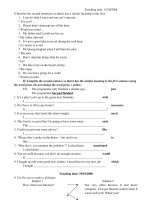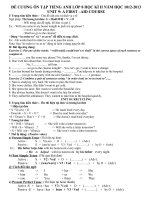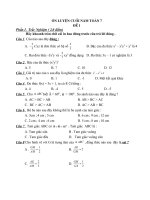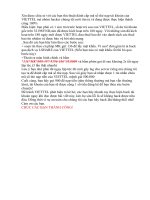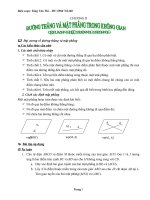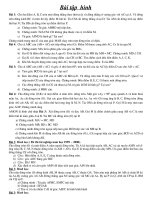Tài liệu ôn tập REPORTED SPEECH hay nhất
Bạn đang xem bản rút gọn của tài liệu. Xem và tải ngay bản đầy đủ của tài liệu tại đây (112.46 KB, 11 trang )
REPORTED SPEECH
I.
USES:
Chúng ta dùng câu tường thuật để nhắc lại, kể lại lời đã được nói trước
đây.
E.g.
Tom: What did you do at school yesterday, Jerry?
Jerry: I played football.
(Tom: Bạn đã làm gì ở trường hơm qua hả Jerry?
Jerry: Mình đã chơi bóng đá)
Tom asked Jerry what he had done at school the day before.
Jerry replied that he had played football.
II. FORM : Thông thường khi chuyển từ câu trực tiếp sang gián tiếp ta lùi lại một
thì
1. Statement: Câu tường thuật
Ex:
Form:
S + said to sb/
told sb + that +
Mệnh đề lùi thì
“I will come back tomorrow” Mary said.
Mary said that she would come back the next day.
Note: said => said that / said to sb => told sb that
Reporting verbs (động từ tường thuật): say, tell, inform, persuade , announce, believe,
claim, explain, reply, say, think .. (+that)
2. Commands, requests: Câu yêu cầu, đề nghị
Form: S+ asked / told + sb + (not) + to V
Ex:
“Don't talk in class” The teacher said to us.
The teacher told us not to talk in class.
3. Offers and Advice: We can use “to do” to report orders and advice
Form:
S+ offered to do , S + advised sb to
dohelp you to write your CV.
– “I’ll
E.x.
My brother offered to help me.
- “I think you should learn how to use computer.”
My teacher advised us to learn how to use computer.
4. Yes / No Questions
Form:
S + asked/wondered/wanted to know + (sb) + if / whether + Mệnh đề lùi thì
Ex:
"Can you speak English, Diep?" I asked.
I asked Diep if she could speak English.
4. Wh-Question
Form:
S + asked + (sb) + Wh + Mệnh đề lùi thì
Ex: “Where are you from?” He asked me
He asked me where I were from.
5. Khơng lùi thì: Ta khơng lùi thì khi tường thuật việc ln ln đúng hoặc vẫn cịn
đúng ở hiện tại.
e.g. “The sun moves around the "earth."
→ She said that the sun moves around the earth.
Form:
S+ V (hiện tại) + (sb) + Mệnh để khơng lùi thì
Ex: “I'm very exhausted now” she says.
She says she is very exhausted now.
* BẢNG LÙI THÌ
DIRECT SPEECH
Simple present
Present continuous
Present perfect
Simple past
Past continuous
Future (will/shall)
Near future (be going to V)
Can
May
Must
Needn’t
* BẢNG LÙI TRẠNG NGỮ
DIRECT SPEECH
this
these
here
now
ago
today
tonight
tomorrow
yesterday
next + N
last + N
REPORTED SPEECH
Simple past
Past continuous
Past perfect
Past perfect
Past perfect continuous
Future in the past (would/ should)
Was/were going to V
Could
Might
Had to
Didn’t have to
REPORTED SPEECH
that
those
there
then
before (earlier)
that day
that night
the next day
the following day
the day after
the previous day
the day before
the following + N
the N + after
the previous + N
the N + before
REPORTED SPEECH
I. Change into the reported speech.
1. He said “I have already read this book”.
____________________________________________________________________
2. Tom said to his sister “I want to buy a gift for our mother”.
____________________________________________________________________
3. Mrs Brown said “Where are they living?"
____________________________________________________________________
4. “Do you know the girl over there?" Tom said.
____________________________________________________________________
5. Mother said "Nam, why don't you go to bed?”
____________________________________________________________________
6. “May I use your telephone?" said my neighbor.
____________________________________________________________________
7. The manager said “Come into my office, please?
____________________________________________________________________
8. “Do not get off the bus while it's going” said the driver.
____________________________________________________________________
9. She asked to the little boy "Take a look at yourself in the mirror!”
____________________________________________________________________
10. “Don't put your elbow on the table!” he said.
____________________________________________________________________
II. Mark the letter A, B, C, or D to indicate the correct answer to each of the following questions.
1. "I'm a big fan of U23.” Derek said. - Derek said he ____ a big fan of U23.
A. was
B. has been
C. were
D. had been
2. "We're watching TV," said the twins. - The twins said they ____ TV.
A. watched
B. were watching
C. have been watching
D. had watched
3. “You've been annoying me all day!" my mum said. - My mum said I ____ her all day.
A. annoyed
B. was annoying
C. have been annoying D. had been annoying
4. "The dog ate my homework!” said Ivan. - Ivan said the dog his homework.
A. was eating
B. has eaten
C.ate
D. had eaten
5. "At one o'clock, I was having lunch," said Molly. - Molly said she ____ lunch at one o'clock.
A. had been having
B. has had
C. is having
D. has been having
6. "You'll get wet without an umbrella," Dad said. - Dad said I ____ wet without an umbrella.
A. will be getting
B. got
C. would be getting
D. would get
7. "He can juggle five balls!" said Angie. - Angie said he ____ five balls.
A. juggled
B. had juggled
C. would juggle
D. could juggle
8. “You must give me your essays," Mrs Vine said. - Mrs Vine said we ____give her our essays.
A. were having to
B. would have to
C. had to
D. must
9. “Could you pass me the salt, please?" I asked the man next to me.
Tasked the man next to me ____ me the salt.
A. pass
B. if he passes
C. to pass
D. if he would pass
10. "Would you mind waiting for a moment?" the shop assistant asked the woman.
The shop assistant asked the woman ____ for a moment.
A. to wait
B. waiting
C. if she waits
D. if she minds waiting
11. “Please don't leave your dirty football boots in the hall," Mum said to Doug.
Mum told Doug ____ dirty football boots in the hall.
A. that he doesn't leave his
B. not to leave his
C. not to leave your
D. don't leave his
12. "Could you tell us where you were at six o'clock?" the police officer asked Barry.
The police officer asked Barry ____ had been at six o'clock.
A. telling him where you
B. where he tells him he
C. to tell him where youD. to tell him where he
13. "Could I have your e-mail address?" I asked Mariella. - I asked Mariella ____ e -mail address.
A. to give me her
B. give me your
C. give me her
D. gave me your
14. "Can I have a new Xbox for my birthday?" I asked my mum.
I asked my mum ____ a new Xbox for my birthday.
A. that she gets me
B. get me
C. to get me
D. if she could have me
15. "What's your name?" she asked me. - She asked me ____.
A. what your name is B. what your name was
C. what my name is
D. what my name was
16. "Are you a student?" the man asked the boy. - The man wanted to know ____.
A. if I was a student
B. if the boy was a student
C. if I am a student
D. if the boy is a student
17. "What school are you going to?" he asked me. - He wanted to know ____.
A. what school am I going to
B. what school you are going to
C. what was the school I go to
D. what school I was going to
18. "I won't be home this evening because I have to work late," Mike said. - Mike said that ____.
A. I wouldn't be home this evening because I had to work late
B. he wouldn't be home this evening because he had to work late
C. he won't be home this evening because he has to work late
D. he wouldn't be home that evening because he had to work late
19. "You can sit here," the stewardess said. - The stewardess said ____.
A. you can sit here
B. I could sit here
C. I could sit there
D. you could sit there
20. “Anna left here an hour ago," she said. - She told me that ____.
A. Anna had left here an hour ago
B. Anna had left there an hour ago
C. Anna had left here an hour before
D. Anna had left there an hour before
21. "I don't want anything to eat now," he said. - He said ____.
A. he doesn't want anything to eat now
B. he didn't want anything to eat then
C. I didn't want anything to eat then
D. I didn't want anything to eat now
22. “I've only had this new bicycle since yesterday," Karen said. - Karen said that ____.
A. I had only had this new bicycle since yesterday
B. he had only had that new bicycle since the day before
C. I had only had this new bicycle since the day before
D. he's only had that new bicycle since the day before
23. "Don't waste water, Mum said to Mary. - Mum told Mary____.
A. that she doesn't waste water
B. to waste water
C. don't waste water
D. not to waste water
24. "In China, waste is growing twice as fast as the population," the lecturer said.
A. The lecturer said that in China, waste was growing twice as fast as the population.
B. The lecturer said that in China, waste is growing twice as fast as the population.
C. The lecturer said that in China, waste has been growing twice as fast as the population.
D. The lecturer said that in China, waste had been growing twice as fast as the population.
25. "Which cities have the worst waste problem?" The student asked the teacher.
A. The student asked the teacher for which cities had the worst waste problem.
B. The student asked the teacher to tell him which cities had the worst waste problem.
C. The student asked the teacher which cities had the worst waste problem.
D. The student asked the teacher which cities had had the worst waste problem.
26. "How to stop humans from filling the world with trash?"
A. Environmentalists are wondering how to stop humans from filling the world with trash.
B. Environmentalists are wondering how humans can stop filling the world with trash.
C. Environmentalists were wondering how humans could stop filling the world with trash.
D. Environmentalists were wondering how to stop humans from filling the world with trash.
27. The shop assistant finally agreed ____ a full refund.
A. giving me
B. to give me
C. give to me
D. to me to give
28. Bill asked me why ____ to go shopping with me.
A. I hadn't invited him B. hadn't I invited him
C. I hadn't him invited
D. hadn't I him invited
29. "Don't come to the interview late," my mom said.
A. My mom told me do not come to the interview late.
B. My mom told me did not come to the interview late.
C. My mom told me not to come to the interview late.
D. My mom told me not coming to the interview late.
30. "I will help you with your CV, Mary," Peter said.
A. Peter advised Mary to write the CV.
B. Peter promised to help Mary with her CV.
C. Peter advised Mary not to write her CV.
D. Peter wanted Mary to help with the CV.
31. “____,” the doctor advised his patient.
A. You had better stop drinking
B. You had better to drink
C. I would like you to drink
D. Please drink some more
32. The woman said she ____ in this company for over 20 years.
A. has been working
B. was working
C. had been working
D. works
33. US scientists claim that they ____ a new vaccine against malaria.
A. were developed
B. have developed
C. had developed
D. was developing
34. If you saw a layer, he'd advise you ____ legal action.
A. take
B. taking
C. to take
D. for taking
35. The lecturer recommended ____ a number of books before the exam.
A. reading
B. to read
C. we reading
D. to have read
36. The boss ____ because he was always behind the deadlines.
A. threatened to dismiss him
B. suggested him to dismiss
C. threatened him to dismiss
D. promised him to dismiss
37. “Go ahead. Jump again,” the instructor ____.
A. urged
B. promised
C. demanded
D. required
38. “____” Jim offered.
A. Can I get you a drink?
B. May I drink?
C. Do you want to drink?
D. Could I drink?
39. “____,” the workers refused.
A. We would like to work overtime
B. We had better work overtime
C. We're afraid that we really don't want to work overtime
D. We're willing to work overtime
40. “____,” Paul reminded me.
A. Don't forget to tailor your CV to match the job descriptions
B. I would tailor your CV if you do not mind
C. I remember to tailor the CV
D. I remember tailoring your CV
41. Ellie asked Stan ____ to look at the new catalogue.
A. did he want
B. do you want
C. whether he wants
D. if he wanted
42. Stephen ____ me he'd bought that suit in a sale.
A. said
B. spoke
C. told
D. claimed
43. “What did the man say when you challenged him?”
“He said he ____ pay for the things in his bag, but I didn't believe him!”
A. is going to
B. has been going to
C. goes to
D. was going to
44. When I last saw Carrie, she told me she ____ of applying for another job, but now she's changed her
mind.
A. thought
B. is thinking
C. was thinking
D. has been thinking
45. “What did they say when they realized you weren't a shoplifter?”- “They apologized __ me.”
A. to doubt
B. they had doubted
C. for doubting
D. the doubt of
46. “What did Maria ask you?” - “She asked me ____ I had ever been abroad.”
A. that
B. whether
C. for
D. About
47. It's about time Mrs Richards apologized to me ____ me a gossip in front of everybody.
A. to have called
B. from calling
C. that she called
D. for having called
48. She may claim ____ a PhD but nobody's ever actually seen the certificate.
A. having
B. to have
C. for having
D. if she has
49. Tammy responded ____ that at least she'd never lied to her parents.
A. to say
B. that she said
C. by saying
D. with having said
50. The woman asked ____ get lunch at school.
A. can the children
B. if the children can
C. whether the children could
D. could the children
51. They said they had got back ____.
A. the following day
B. the day after tomorrow
C. the next day
D. the previous day
52. The accused denied ____ in the vicinity of the murder scene.
A. to have ever been
B. have ever been
C. having been ever
D. ever having been
53. We complained ____ the manager ____ the poor service we received at the restaurant.
A. on - about
B. at - for
C. with - of
D. to - about
54. Police are advising ____ away from the building.
A. people to stay
B. people staying
C. people stay
D. people will stay
55. The old man warned the young boys ____ in the deep river.
A. to swim
B. not to swim
C. don't swim
D. against not
swimming
56. “You must give me your essays,” Mrs. Vine said.
Mrs. Vine said we ____ give her our essays.
A. were having to
B. will have to
C. had to
D. would have to
III. Mark the underlined part that needs correction in each of the following questions.
1. Tim called yesterday and said he needed the report right now.
A
B
C
D
2. Sally called from Miami and said that she was swimming here.
A
B
C
D
3. They complained that there isn't any fresh water in the local area.
A
B
C
D
4. Rosy said that she will come back there on another project the following year.
A
B
C
D
5. Tony promised that he would do his homework today.
A
B
C
D
6. Clarence said he couldn't have repaired the car the next day.
A
B
C
D
7. Mr Jones told his children not to wasting fresh water.
A
B
C
D
8. The teacher asked his students to focus on your topic.
A
B
C
D
9. Sally suggested to go to school by bicycle in order to save energy.
A
B
C
D
10. Harry offered lending a hand with keeping the school environment clean.
A
B
C
D
IV. Mark the letter A, B, C, or D to indicate the sentence that is closest in meaning to each of the
following sentences.
1. He received a letter saying that his application has been rejected.
A. The letter he received said that his application had been rejected.
B. His application has been rejected by the letter he received.
C. It is said in the letter he received that his application has been rejected.
D. That his application has been rejected is why he received with the letter.
2. "Your application must be submitted before the end of the month," said the secretary to applicants.
A. The secretary told the applicants not to submit their application before the end of the month.
B. The secretary said that the application had to be submitted before the end of the month.
C. The secretary asked that the applicants submit their application before the end of the month.
D. The secretary reminded the applicants to submit their applications before the end of the month.
3. "Have your seat, please," said the interviewer to him.
A. The interviewer invited him to sit down.
B. The interviewer offers him a post.
C. The interviewer asked him where his seat was.
D. The interviewer left him a seat.
4. “Never leave any gap unfilled in your application form," the student consultant said.
A. The student consultant said he never left any gap unfilled in his application form.
B. The student consultant advised the students not to leave any gap unfilled in their application
form.
C. The student consultant told the students to leave any gap unfilled in their application form.
D. The student consultant helped the students leave gap unfilled in their application form.
5. “You should learn about the company before you come for the interview,” said the teacher to class.
A. The teacher suggested that the students learn about the company before coming for the
interview.
B. The teacher asked the students to learn about the company before coming for the interview.
C. The teacher requested that the students learn about the company before coming for the interview.
D. The teacher warned the students to learn about the company before coming for the
interview.
V. Choose the word or phrase among A, B, C or D that best fits the blank space in the following
passage.
World Environment Day which is (1) ____ on 5th June every year in an important day in the calendar of
the United Nations. It is one of the ways the United Nations uses to advocate for environmental (2) ____ and
call for political action.
Every year, UNEP (the Environment Program of the United Nations) develops a theme which is used
globally to raise (3) ____ and call for support from governments, organizations, and individuals from all
over the world.
The theme for 2015 was "Seven Billion Dreams. One Planet. Consume with Care”. This would also serve as
the slogan for the World Environmental Day 2015. The meeting of this theme and slogan is that we have five
(4) ____ with more than seven billion people combined. Although we have about 7 billion people, we just
have one planet that we live and survive. The surface area is limited, shelter and food also limited. If we
continue using the available natural (5) ____ as we do today, our future generations may be (6) ____ to go
hungry and without homes. This is why it is of vital importance to consume (7) ____food that is available
with care. Stop the wastage and use whatever resource that is available according to need, not greed.
“Join the race to make the world a better place” is the theme and (8) ____ for 2016 UN World Environment
Day. This slogan (9) ____ a clear message and asks everyone to get involved (10) ____ making the world a
better place to live in.
1. A. found
B. acted
C. held
D. celebrated
2. A. experience
B. protection
C. decrease
D. pollution
3. A. feature
B. activity
C. ability
D. awareness
4. A. areas
B. continents
C. plants
D. stars
5. A. sources
B. resources
C. balances
D. increase
6. A. had
B. made
C. forced
D. accused
7. A. which
B. whatever
C. who
D. what
8. A. slogan
B. flag
C. poster
D. brand
9. A. requests
B. asks
C. carries
D. depends
10. A. from
B. to
C. within
D. in
VI. Choose the word or phrase among A, B, C or D that best fits the blank space in the following
passage.
There are many ways that (1) ____ helps the environment, and even the smallest step can have
significant results.
The environmental problem of (2) ____ is a difficult issue to fix. As more waste is put into landfills, the
bigger the problem gets. Wastes that are not biodegradable or are slow to decompose can (3) ____ in landfill
sites for centuries, often emitting gases that could be harmful to the environment. Keeping paper out of
landfills is just one way that recycling helps the environment.
Recycling items often uses less energy than manufacturing products from natural sources. Making paper that
is using recycled pulp, (4) ____, is much less energy intensive than using new wood. While there are
benefits to growing trees because of the carbon dioxide that they consume, it will be the damage (5) ____ is
done to the environment by putting paper in landfills and using energy to produce new items.
Waste in landfills emit gases as it rots. This can pollute the environment. Anyone who has passed a
landfill site (6) ____ hot weather will be familiar with the unpleasant smell and flies that can be found near a
landfill site. Reducing the items in landfills will help to (7) ____ the pollution that it causes. Recycling
wastes also typically emits less carbon dioxide and carbon monoxide, thus reducing the carbon footprint of a
product.
(8) ____ benefit of recycling is that there is often a significant cost saving to be made when using
recycle goods. Recycling leaves and grass, for instance, is a great way to make compost. (9) ____
homemade compost is obviously a lot cheaper than buying compost and this is a useful way to save money.
Saving money through recycling ultimately helps the environment.
Recycling is just one of many ways that we can help the environment. Every step that we take, however
small, is one more towards helping and supporting the environment in which we live. Getting everyone
involved, from children to adults, can help produce a better environment for many (10) ____ to come.
1. A. recycling
B. extinction
C. disappearance
D. discharge
2. A. hills
B. mountain
C. landfills
D. landscapes
3. A. remain
B. effect
C. cause
D. attack
4. A. so
B. but
C. although
D. for instance
5. A. who
B. which
C. that
D. x
6. A. most
B. during
C. almost
D. nearly
7. A. Last
B. reduce
C. increase
D. stretch
8. A. Others
B. Other
C. Another
D. Further
9. A. Using
B. Recycled
C. Concluded
D. Made
10. A. houses
B. generations
C. places
D. trees
VII. Read the passage, and choose the correct answer A, B, C or D for each question.
HOW TO STOP WATER POLLUTION
Water pollution is one of the biggest threats to the environment today. There are several sources of water
pollution ranging from sewage and fertilizers to soil erosion. The impact of water pollution on wildlife and
their natural habitats can be immense. There are also a number of things that the average person can do to
help stop water pollution.
We should conserve the soil because soil conservation influences water pollution through erosion. As
soil is eroded by water, it transfers sediment from the land to the body of water, which is polluted by the
chemicals in the sediment. Phosphorus and industrial chemicals can be pulled into water through soil
erosion. When phosphorus levels in water become too high, they can lead to algae blooms that can cause
massive fish deaths and make water unsafe for human use. The best way to prevent soil erosion is to keep
the banks of rivers well-covered with plants or trees. Planting trees can have a significantly positive impact
on the reduction in soil erosion.
The oil used to lubricate engines in all types of machines needs to be changed regularly. When the oil is
changed, it presents a number of environmental hazards if not disposed of properly. When a leaky engine
releases this oil into the street, it runs to the sewer and makes its way into waterways.
Wherever you see a lot of human recreation, you will almost always see lots of evidence of human use.
Wrappers, bottles and other trash are unfortunately a common site at many well-used beaches and rivers
around the world. It should be fairly obvious that the trash from these places often ends up in waterways and
can cause pollution. Plastics are an especially big issue when it comes to water contamination at beaches and
waterways. Picking up litter wherever you find it is honestly the best, fastest way to do your part to stop this
type of water pollution.
Organize cleaning parties with local people to make the reach larger. Get businesses involved as sponsors
who will donate prizes to the person who collects the most trash if you're having a hard time finding people
to sign up to help.
It is estimated that the consumption of plastic by humans is between 250 and 300 million tons a year.
About 80% of the plastic in the oceans came from the land. Using alternatives to plastics or using “less
disposable” plastics whenever possible can have a surprising impact on ocean pollution. The fact that plastic
is cheap and useful for different purposes makes it obvious choices for many people.
1. Lubricants can cause environmental hazards when ____.
A. they may be found in the streets
B. they engines work perfectly
C. they are not disposed properly
D. they are changed regularly
2. The following are the effects of water pollution EXCEPT that ____.
A. it may make water unsafe for human use
B. it may spoil the beauty of beaches or waterways
C. it may cause massive fish deaths due to algae blooms
D. it may keep the banks of rivers well-covered with trees
3. Soil erosion can lead to water pollution because ____.
A. massive fish deaths will make the rivers unsafe for human use
B. soil can be eroded by rain water
C. soil erosion can occur naturally everywhere
D. chemicals in the sediment from the soil erosion will pollute water
4. In order to make beaches clean and green, we should ____.
A. follow the trash from these places which often ends up in waterways
B. find places with a lot of human recreation and of evidence of human use
C. organize campaigns in which prizes will be given to the business who collects the most
trash
D. ask local people to take part in cleaning up the beaches, maybe with the sponsor from
businesses
5. We can infer from the passage that ____.
A. using too much plastic can cause bad effects on ocean pollution
B. using plastics only causes ocean pollution
C. we don't know how to stop water pollution
D. alternatives to plastics or “less disposable” plastics can make the situation worse
KEY
I. Change into the reported speech.
1. He said “I have already read this book”.
He said that he had already read that book.
2. Tom said to his sister “I want to buy a gift for our mother”.
Tom told his sister that he wanted to buy a gift for thier mother.
3. Mrs Brown said “Where are they living?"
Mrs Brown asked where they were living.
4. “Do you know the girl over there?" Tom said.
Tom asked me if I knew the girl over there.
5. Mother said "Nam, why don't you go to bed?”
Mother told Nam not to go to bed.
6. “May I use your telephone?" said my neighbor.
My neighbor asked me to use my telephone.
7. The manager said “Come into my office, please?
The manager asked to come in to his office.
8. “Do not get off the bus while it's going” said the driver.
The driver asked us not to get off the bus while it was going.
9. She asked to the little boy "Take a look at yourself in the mirror!”
She told the little boy to take a look at himself in the mirror.
10. “Don't put your elbow on the table!” he said.
He asked me not to put my elbow on the table.
II. Mark the letter A, B, C, or D to indicate the correct answer to each of the following questions.
1. B
2. B
3. D
4. D
5. A
6. D
7. D
8. C
9. C
10. A
11. B
12. D
13. A
14. C
15. D
16. B
17. D
18. D
19. C
20. D
21. B
22. B
23. D
24.A
25.C
26.D
27. B
28. A
29. C
30. B
31. A
32. C
33. B
34. C
35. A
36. A
37. A
38. A
39. C
40. A
41. D
42. C
43. D
44. C
45. C
46. B
47. D
48. B
49. C
50. C
51. D
52. D
53. D
54. A
55. B
56. C
III. Mark the underlined part that needs correction in each of the following questions.
1. D
2. D
3. B
4. B
5. D
6. B
7. D
8. D
9. B
10. B
IV. Mark the letter A, B, C, or D to indicate the sentence that is closest in meaning to each of the
following sentences.
1. A
2. B
3. A
4. B
5. A
V. Choose the word or phrase among A, B, C or D that best fits the blank space in the following
passage.
1. C
2. B
3. D
4. B
5. B
6. C
7. B
8. A
9. C
10. D
VI. Choose the word or phrase among A, B, C or D that best fits the blank space in the following
passage.
1. A
2. C
3. A
4. D
5. C
6. B
7. B
8. C
9. A
10. B
VII. Read the passage, and choose the correct answer A, B, C or D for each question.
1. C
2. D
3. D
4. D
5. A

